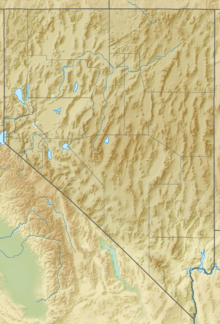Johnnie Range facts for kids
Quick facts for kids Johnnie Range |
|
|---|---|
| Highest point | |
| Elevation | 1,133 m (3,717 ft) |
| Geography | |
| Country | United States |
| State | Nevada |
| District | Nye County |
| Range coordinates | 36°24′55.846″N 116°6′3.117″W / 36.41551278°N 116.10086583°W |
| Topo map | USGS Mount Schader |
The Johnnie Range is a mountain range found in the Mojave Desert. This desert area is located in southern Nye County, Nevada, in the United States. It's a cool place to explore the natural beauty of the desert.
Contents
Exploring the Johnnie Range
The Johnnie Range is a group of mountains that rise from the desert floor. It's part of the vast Mojave Desert, which covers parts of California, Nevada, Arizona, and Utah. This range is a landmark in Nye County, Nevada.
Where is the Johnnie Range Located?
The Johnnie Range is in the southern part of Nye County, Nevada. It's found within the Amargosa Desert, which is a smaller part of the Mojave Desert. The range's exact location can be pinpointed using special coordinates. These coordinates help scientists and explorers find specific spots on Earth.
The range's coordinates are 36°24′55.846″N and 116°6′3.117″W. This means it's north of the Equator and west of the Prime Meridian. The USGS helps map out these areas. They create detailed maps like the Mount Schader map, which shows the Johnnie Range.
What Makes Johnnie Range Special?
The highest point in the Johnnie Range reaches about 1,133 meters (or 3,717 feet) above sea level. While not the tallest mountains in the world, they stand out in the desert landscape. The range offers unique views of the surrounding desert.
The Johnnie Range is a great example of a desert mountain range. It shows how mountains can form even in dry places. The landscape is often rocky and rugged.
Plants and Animals of the Range
Even though it's a desert, the Johnnie Range is home to many interesting plants and animals. They have special ways to survive in the dry climate. You might find plants like different types of cacti and desert shrubs. These plants can store water for a long time.
Animals like desert tortoises, various lizards, and birds live here. You might also spot coyotes or jackrabbits. These animals are adapted to the heat and lack of water. They often come out during cooler parts of the day or night.
 | Aaron Henry |
 | T. R. M. Howard |
 | Jesse Jackson |


